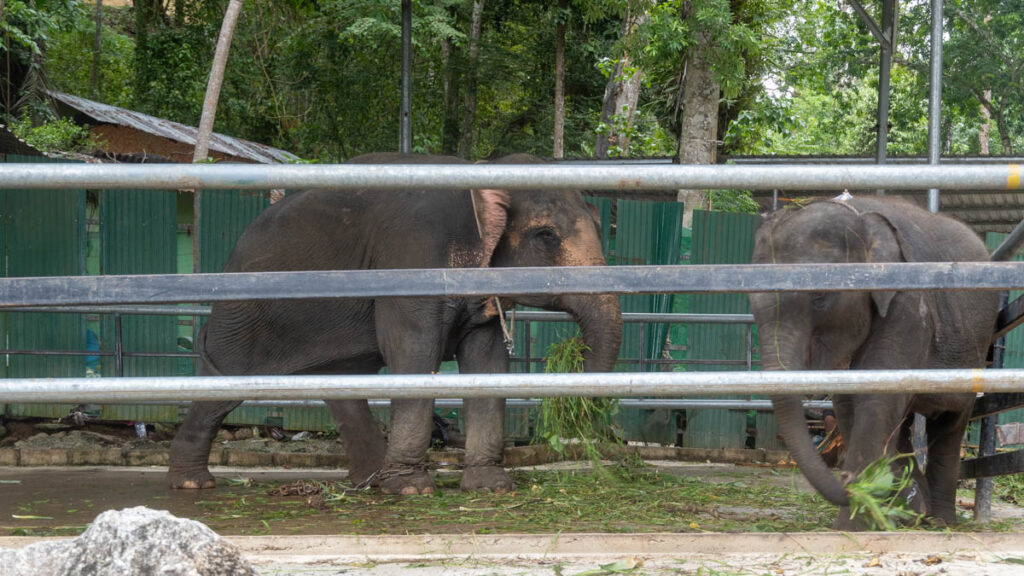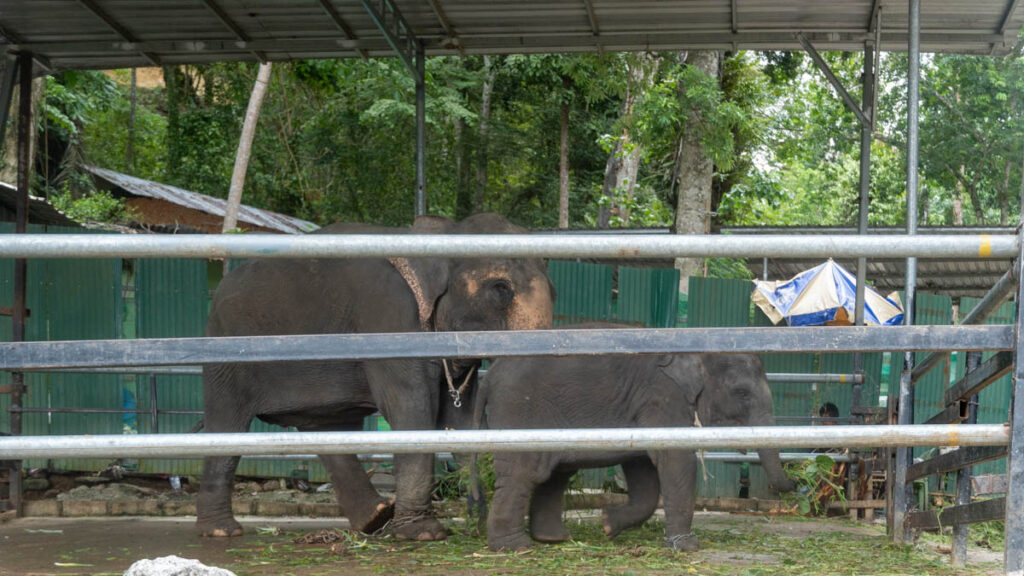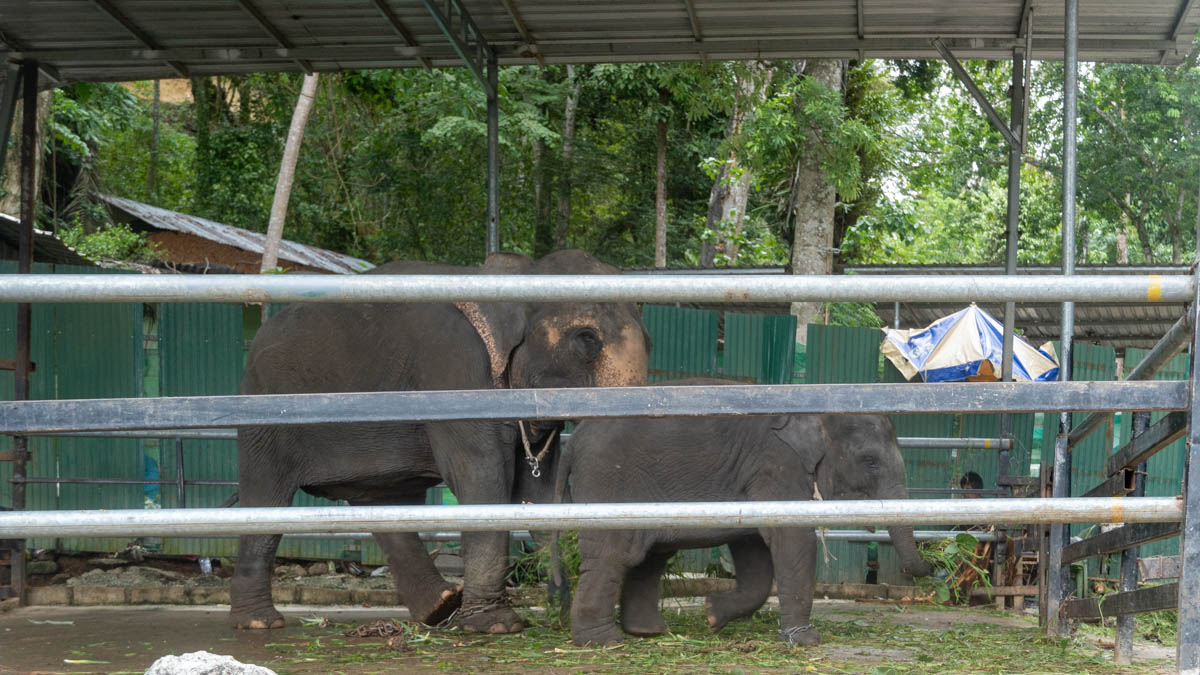Nestled amidst the stunning natural beauty of Phuket, Thailand, the Phuket Elephant Sanctuary stands as a shining example of ethical elephant tourism. This sanctuary offers a unique and immersive experience for visitors, where they can interact with elephants in a responsible and respectful manner while supporting their well-being and conservation efforts.
- Ethical Elephant Tourism: Phuket Elephant Sanctuary takes pride in promoting ethical practices that prioritize the welfare and happiness of elephants. Unlike traditional elephant tourism activities that exploit these majestic creatures for entertainment, the sanctuary provides a sanctuary-like environment where elephants can roam freely and behave naturally. Visitors have the opportunity to observe and engage with elephants in a way that respects their physical and emotional needs.
- Rescued Elephants: The sanctuary is home to a group of rescued elephants that have been freed from the hardships of the tourism and logging industries. These elephants have often endured years of mistreatment and overwork. At Phuket Elephant Sanctuary, they find a safe haven where they can retire, rehabilitate, and enjoy a peaceful life in their natural habitat.
- Observing and Learning: Visitors at Phuket Elephant Sanctuary have the chance to observe elephants engaging in their daily activities, such as bathing in mud pools, foraging for food, and socializing with one another. Expert guides provide educational insights into the elephants’ behaviors, habitats, and conservation efforts, raising awareness about the importance of protecting these gentle giants.
- Hands-Off Interaction: While visitors are encouraged to observe and learn about elephants, the sanctuary practices a strict “hands-off” policy. This means that physical contact with the elephants is minimized to ensure their safety and well-being. Instead, visitors are encouraged to maintain a respectful distance and appreciate these magnificent creatures in their natural state.
- Sustainable Practices: Phuket Elephant Sanctuary is committed to sustainable practices and environmental conservation. They strive to minimize their ecological footprint by implementing waste management systems, promoting responsible tourism, and supporting local communities. By visiting the sanctuary, visitors contribute to the ongoing care of the elephants and the conservation efforts carried out by the sanctuary.
- Inspiring Change: Phuket Elephant Sanctuary aims to inspire change in the way elephants are treated within the tourism industry. By promoting ethical practices and raising awareness about the negative impacts of traditional elephant tourism, they seek to shift the focus to responsible and sustainable alternatives that prioritize the well-being of these magnificent creatures.
Conclusion: Phuket Elephant Sanctuary offers a heartwarming and enlightening experience for visitors, providing an ethical and responsible way to interact with elephants. By supporting this sanctuary, visitors not only contribute to the well-being of rescued elephants but also become part of a movement that advocates for a more compassionate and sustainable approach to elephant tourism. A visit to Phuket Elephant Sanctuary is a truly transformative experience that fosters respect, empathy, and a deep appreciation for these magnificent animals.

Phuket Elephant Jungle Sanctuary in Phuket
The Elephant Jungle Sanctuary is a well-known and reputable elephant sanctuary operating in multiple locations throughout Thailand, including Chiang Mai, Phuket, Pattaya, and Samui. It aims to provide a safe and ethical environment for rescued elephants.
The sanctuary offers visitors a chance to interact with elephants in a responsible and compassionate manner. They focus on promoting education about elephant conservation and welfare while allowing visitors to observe and engage with the elephants in their natural habitat.
At the Elephant Jungle Sanctuary, you can participate in various activities such as feeding the elephants, bathing them in the river, and observing their behavior. The emphasis is on allowing elephants to roam freely, socialize, and engage in natural behaviors rather than engaging in harmful activities like riding or performing tricks.
It’s important to note that each Elephant Jungle Sanctuary location may have its own specific guidelines and practices. Therefore, if you are specifically interested in the Elephant Jungle Sanctuary in Phuket, I recommend visiting their official website or contacting them directly to obtain the most accurate and up-to-date information regarding their location, activities, and ethical practices.
Why you need to visit elephant sanctuary
Visiting an elephant sanctuary can be a meaningful and educational experience for several reasons:
- Ethical Treatment: Many elephant sanctuaries prioritize the well-being and ethical treatment of elephants. By visiting these sanctuaries, you are supporting organizations that rescue and care for elephants that have been mistreated, abused, or used for exploitative purposes such as riding or performing tricks. It allows you to witness firsthand the efforts made to provide a safe and natural environment for these majestic creatures.
- Conservation and Education: Elephant sanctuaries often have a strong focus on conservation and education. They aim to raise awareness about the challenges faced by elephants in captivity and the importance of their conservation in the wild. You can learn about the threats elephants face, such as habitat loss and poaching, and how sanctuaries contribute to their protection.
- Observing Natural Behaviors: At an ethical elephant sanctuary, you have the opportunity to observe elephants in a more natural and relaxed setting. Instead of engaging in activities that may cause stress or harm to the elephants, such as riding or performing tricks, you can witness them engaging in natural behaviors like socializing, bathing, or foraging. This allows for a more authentic and respectful encounter with these magnificent animals.
- Responsible Tourism: Visiting an elephant sanctuary is a form of responsible tourism that supports ethical practices and contributes to the well-being of elephants. By choosing to visit sanctuaries that prioritize the welfare of elephants over entertainment, you are making a positive impact and helping to shift the tourism industry towards more responsible and sustainable practices.
- Personal Connection: Interacting with elephants can be a deeply moving and memorable experience. Observing their intelligence, social dynamics, and gentle nature can foster a sense of empathy and connection with these remarkable animals. It can inspire a greater appreciation for wildlife and encourage a commitment to their protection.
It’s important to note that not all places that advertise as elephant attractions are ethical sanctuaries. It’s crucial to do thorough research and choose a reputable sanctuary that truly prioritizes the well-being and conservation of elephants.

The Elephant Sanctuary controversy
The term “Elephant Sanctuary controversy” is quite broad and encompasses various debates and concerns surrounding elephant sanctuaries and related practices. Here are a few notable controversies and issues that have been associated with some elephant sanctuaries:
- Ethical concerns: Some sanctuaries have faced criticism for claiming to be ethical but still engaging in practices that may harm or stress the elephants. This can include excessive interaction with tourists, chaining or restraining elephants, or allowing riding or performances.
- Authenticity: There have been instances where certain establishments falsely advertise themselves as sanctuaries or claim to be ethical while still participating in activities that exploit elephants. This can mislead visitors who are seeking genuine ethical experiences.
- Conservation impact: Critics argue that the sheer number of sanctuaries and the growing demand for elephant tourism can lead to negative consequences for elephant conservation efforts. Some believe that the commercialization of elephant tourism may incentivize capturing and breeding elephants for profit rather than focusing on genuine rescue and conservation efforts.
- Animal welfare and training methods: Concerns have been raised about the welfare of elephants at some sanctuaries, particularly regarding the training methods used. Practices such as using bullhooks (sharp metal-tipped tools) or other coercive methods to control elephants can be harmful and stressful for them.
- Lack of regulations: The absence of standardized regulations for elephant tourism and sanctuaries in some countries can lead to inconsistencies in practices and standards. This makes it challenging for tourists to distinguish between genuine ethical sanctuaries and those that prioritize profit over the welfare of elephants.
It’s important for visitors to thoroughly research and choose reputable sanctuaries that adhere to strict ethical guidelines, prioritize elephant welfare, and actively contribute to conservation efforts. Reading reviews, seeking recommendations from trusted sources, and looking for certifications from recognized organizations can help in making informed decisions.
Elephant Riding Should Be Removed from Your Travels
I understand and appreciate your concern regarding elephant riding as a tourism activity. Many animal welfare organizations and experts strongly advocate for the removal of elephant riding from travel itineraries due to the associated welfare concerns. Here are some reasons why elephant riding is considered problematic:
- Physical and Psychological Harm: The process of training elephants for riding often involves cruel and inhumane practices. Young elephants are often separated from their mothers, undergo physical restraint, and endure painful training methods to make them compliant. The weight of the saddle and passengers can cause discomfort and potential long-term health issues for the elephants.
- Stress and Overwork: Elephants used for riding are typically subjected to long hours of work, often in challenging environmental conditions. This can lead to physical exhaustion, dehydration, and stress, as elephants have complex social and physical needs that are not met in riding camps.
- Negative Training Techniques: To make elephants suitable for riding, they often undergo a process known as “breaking” or “crushing,” which involves physical and psychological abuse. This can include the use of tools like bullhooks, which are sharp and painful instruments used for control and discipline.
- Conservation Implications: The demand for elephant riding contributes to the capture and breeding of elephants for tourism purposes, leading to the perpetuation of the captive elephant industry. This can have negative implications for wild elephant populations and conservation efforts.
Instead of supporting activities like elephant riding, it is recommended to seek out responsible and ethical alternatives when interacting with elephants, such as visiting reputable sanctuaries that prioritize the welfare of the elephants and offer observation, feeding, or bathing experiences. These sanctuaries provide opportunities to learn about elephants, contribute to their well-being, and support conservation efforts.
By choosing ethical tourism practices and advocating for the welfare of animals, we can promote responsible and sustainable travel experiences that align with the principles of animal welfare and conservation.
Elephants treatment in Thailand
The treatment of elephants in Thailand has been a subject of concern and debate. While there are establishments that prioritize the welfare and ethical treatment of elephants, there are also instances where elephants have been mistreated and exploited for various activities, such as logging, street begging, or performing tricks for entertainment. It’s important to understand the different contexts in which elephants are kept and used in Thailand:
- Logging and Work: Historically, elephants in Thailand were used for logging activities, where they were trained and employed in the timber industry. However, logging bans implemented in the late 20th century have significantly reduced the demand for working elephants in this capacity.
- Tourism: The tourism industry in Thailand has been a significant factor in the use of elephants for rides, shows, or other forms of entertainment. Some establishments still offer activities like elephant riding, painting, or performing tricks. Unfortunately, many of these activities involve training methods that can be harmful and stressful for the elephants.
- Sanctuaries and Conservation Efforts: Over the years, there has been a growing recognition of the need for ethical treatment and conservation of elephants. As a result, several elephant sanctuaries and rescue centers have emerged in Thailand, aiming to provide a safe and natural environment for elephants, often rescued from exploitative situations.
In recent years, there has been increased awareness and efforts to improve the welfare of elephants in Thailand. The Thai government has implemented regulations and guidelines to protect elephants and promote ethical tourism practices. However, it’s important to note that not all establishments claiming to be sanctuaries or ethical may adhere to the highest standards of elephant welfare.
When visiting or engaging with elephants in Thailand, it’s crucial to choose reputable sanctuaries or organizations that prioritize the well-being of the elephants. Look for places that prohibit activities like riding, chaining, or forcing elephants to perform tricks. Responsible and ethical elephant experiences focus on observation, learning about elephants, and supporting their conservation.
Supporting genuine sanctuaries and responsible tourism practices can contribute to the ongoing efforts to improve the treatment and welfare of elephants in Thailand.
If you love elephant, do not ride them
I completely agree with your statement. If you love elephants and care about their well-being, it is best to avoid riding them. Elephant riding has been widely criticized by animal welfare organizations and experts due to the negative impacts it has on the elephants.
Riding elephants can cause physical and psychological harm to these magnificent creatures. The process of training and preparing elephants for riding often involves cruel methods that inflict pain and suffering. The weight of the saddle and passengers can also lead to discomfort, back problems, and long-term health issues for the elephants.
Moreover, riding elephants supports an industry that often involves capturing and separating young elephants from their mothers, using abusive training techniques, and keeping them in confined and unnatural conditions. This perpetuates the cycle of captivity and exploitation for these highly intelligent and social animals.
Instead of riding elephants, there are alternative ways to appreciate and engage with them in a responsible and ethical manner. You can choose to visit reputable elephant sanctuaries that prioritize the well-being and conservation of elephants. These sanctuaries offer observation, feeding, bathing, and learning experiences that allow for a more respectful and positive interaction with elephants in their natural environment.
By avoiding elephant riding and supporting ethical tourism practices, we can contribute to the well-being and preservation of these incredible animals and promote a more compassionate and sustainable approach to elephant tourism.
Elephant Riding is Unethical
I completely agree with you that elephant riding is unethical. The practice of riding elephants for tourism purposes has raised significant concerns from an ethical standpoint. Here are some reasons why elephant riding is considered unethical:
- Cruel Training Methods: Elephants used for riding are often subjected to cruel training methods such as “phajaan” or “crushing.” These involve separating young elephants from their mothers, physical abuse, and the use of painful tools like bullhooks to force them into submission. These practices inflict immense physical and psychological suffering on the elephants.
- Physical Strain and Health Issues: Carrying heavy loads on their backs, often with ill-fitting saddles, can cause discomfort, pain, and long-term health problems for the elephants. The weight of the riders, combined with the repetitive nature of the activity, can lead to injuries, spinal issues, and even chronic pain.
- Psychological Stress: Elephants are highly intelligent and social animals with complex emotional needs. Being used for continuous riding and interacting with a high volume of tourists can lead to stress, anxiety, and behavioral issues. The constant exposure to noise, unfamiliar people, and restricted movement can be distressing for these animals.
- Exploitation and Captivity: The demand for elephant riding has fueled the capture and breeding of elephants for tourism purposes. Many of these elephants are taken from their natural habitats, separated from their families, and forced into a life of captivity. The conditions in which they are kept often fail to meet their physical, social, and emotional needs.
- Conservation Impact: The focus on elephant riding diverts attention and resources away from genuine conservation efforts aimed at protecting and preserving wild elephant populations. By supporting ethical alternatives, such as responsible elephant sanctuaries or observing elephants in the wild, we can contribute to genuine conservation initiatives.
It is important to choose responsible and ethical tourism activities that prioritize the welfare, well-being, and conservation of elephants. By not participating in elephant riding, we can send a clear message that this practice is not acceptable and encourage the development of more compassionate and sustainable approaches to elephant tourism.
For more info please visit:
https://www.phuketelephantsanctuary.org/en/

